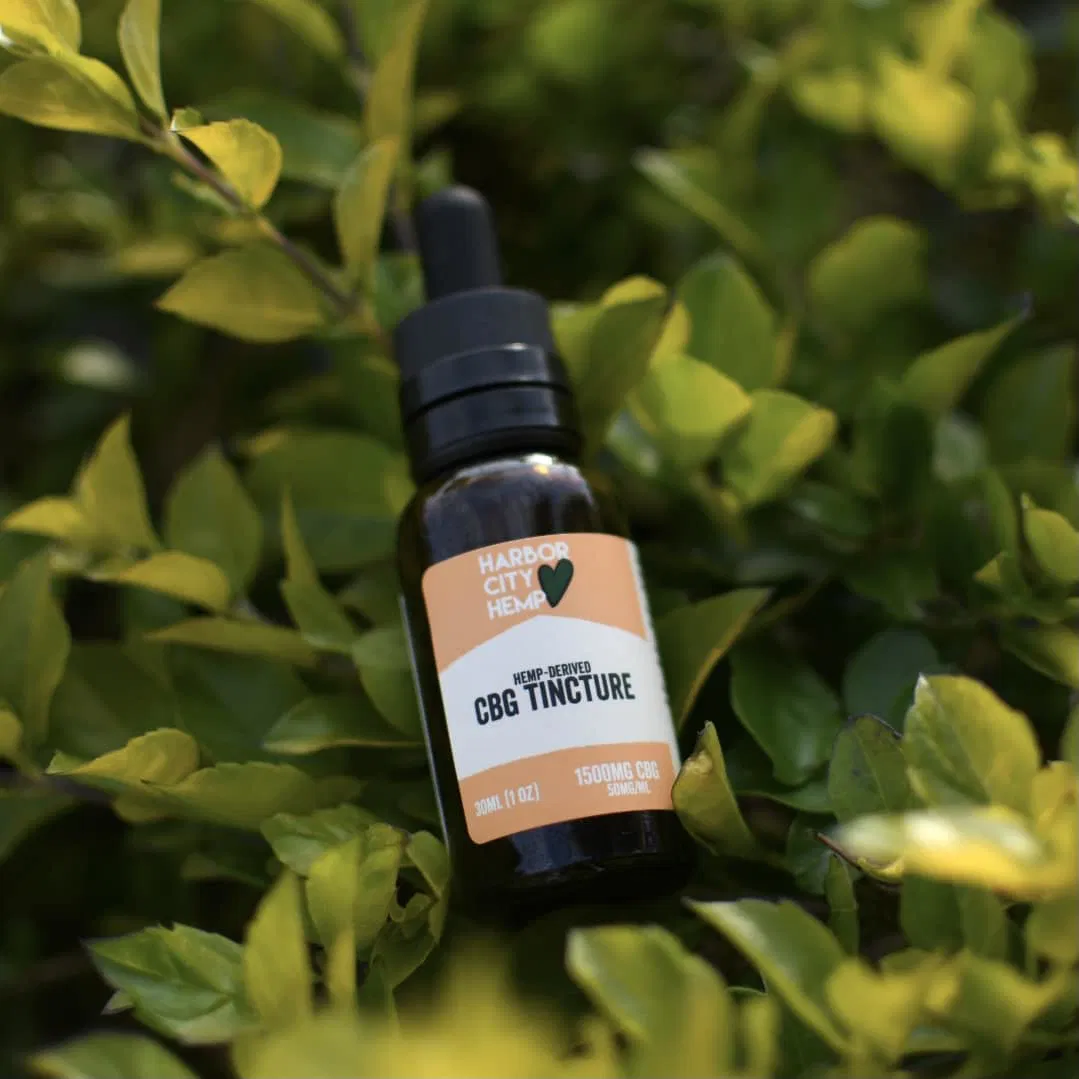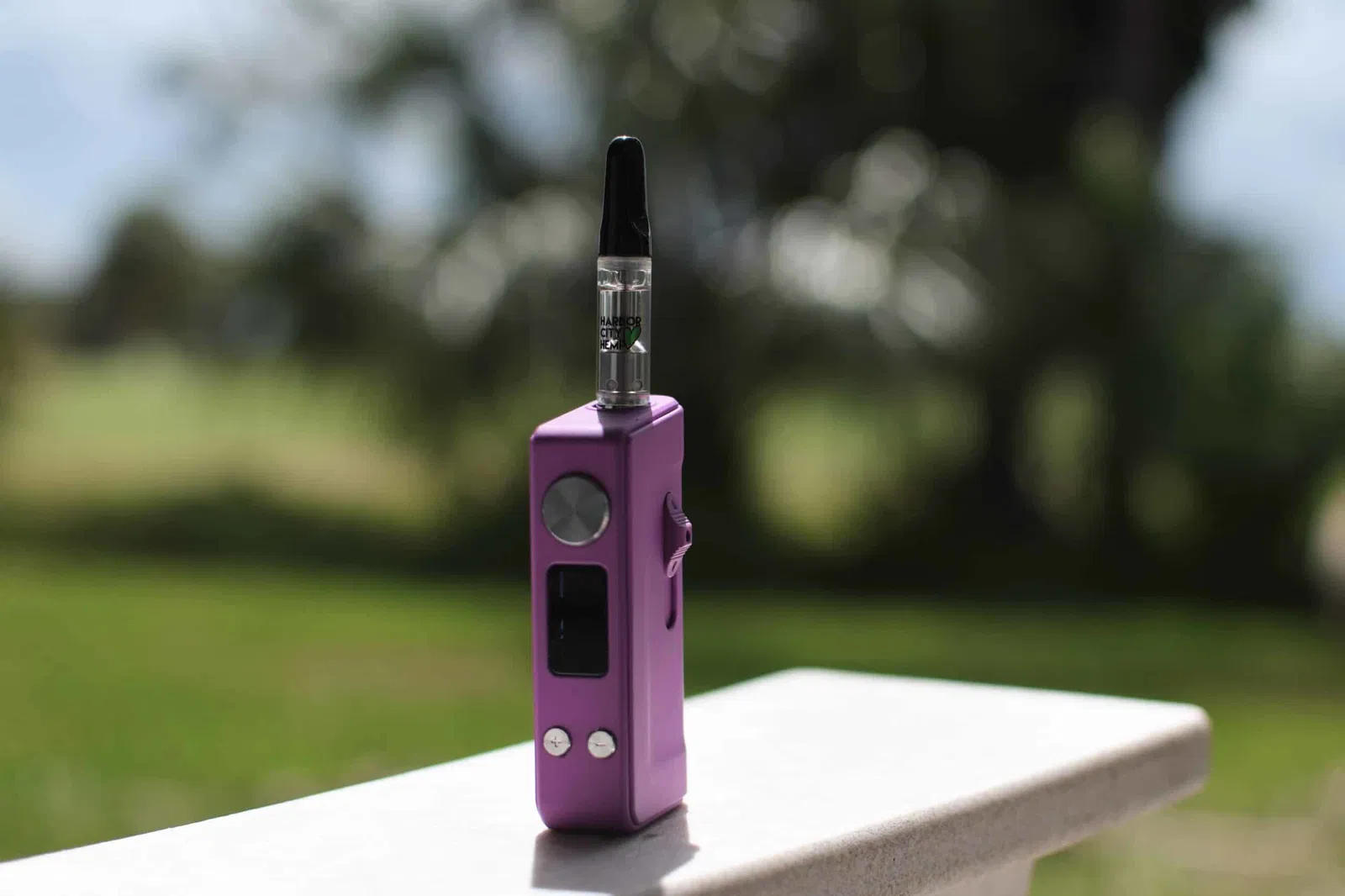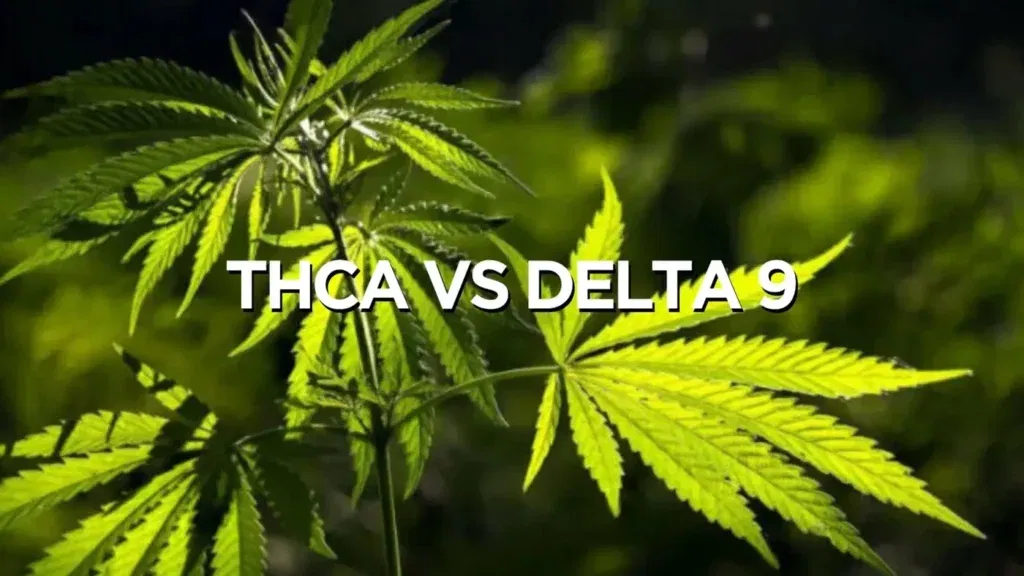Now that you are here, you’ve probably heard of Delta 9 THC, the rockstar of cannabinoids. But have you met its less-known counterpart, THCa? While THC gets all the hype for its psychoactive punch, its lesser-known sibling, THCa, holds its secrets.
In the expansive realm of cannabis acronyms – CBD, THC, CBN, and more – distinguishing these compounds can sometimes feel like navigating a complex code. However, understanding these differences is crucial if you want to find what best suits your preferences.
In this post, we‘ll take a closer look at THCa and Delta 9 THC, examining their unique properties and potential impact. We‘ll also explore different consumption methods, so you can find the best way to experience these cannabinoids.
So get your favorite pack of edibles, relax, and let‘s see which cannabinoid will win your heart.

How THCa and Delta 9 Differ?
While the differences between THCa and Delta 9 THC may seem subtle at first glance, these nuances play a crucial role in shaping their effects.
Let‘s take a look at their molecular structures and distinct properties to uncover the subtle yet impactful variations that differentiate THCa from Delta 9 THC.
THCa Molecular Structure
What is THCa, you ask? Tetrahydrocannabinolic Acid (THCa) is the primary cannabinoid in raw cannabis. It possesses a molecular composition that distinguishes it from its more renowned derivative, Delta 9 THC.
At its core, THCa consists of 22 carbon atoms, 30 hydrogen atoms, and 2 oxygen atoms, forming a complex structure encapsulated by a carboxylic acid group. This distinctive carboxylic acid group is a crucial aspect of THCa, contributing not only to its molecular structure but also to its unique physical characteristics.
THC Molecular Structure
Delta 9 Tetrahydrocannabinol (Delta 9 THC), the key psychoactive compound in cannabis, is the result of the decarboxylation of THCa. This process, often triggered by heat through smoking, vaporization, or cooking, removes the carboxylic acid group from THCa, transforming it into Delta 9 THC.
The molecular composition of Delta 9 THC closely mirrors that of THCa but lacks the carboxylic acid group, making it a potent psychoactive agent.
Conditions and Factors for Decarboxylation
The decarboxylation of THCa is influenced by various conditions and factors. Temperature plays a crucial role, with higher temperatures accelerating the process and vice versa. Smoking or vaporizing cannabis at relatively high temperatures can rapidly convert THCa to Delta 9 THC.
Additionally, factors such as humidity, the age of the cannabis, and exposure to light can impact the efficiency of decarboxylation.
THCa Properties and Characteristics
THCa, in its natural state, is a crystalline substance that gives certain cannabis strains a snowy or frosty appearance. This crystalline structure contributes to its solid form and serves as a visual indicator of the compound’s abundance in raw, unheated cannabis.
More importantly, THCa is non-psychoactive, unlike its decarboxylated counterpart THC. This means that the consumption of raw cannabis containing THCa does not induce the typical euphoric effects associated with the psychoactive compounds found in heated or aged cannabis.
THC Properties and Characteristics
Delta 9 THC appears in various cannabis strains as a resinous substance, contributing to the plant’s overall potency.
The absence of the carboxylic acid group enhances Delta 9 THC’s bioavailability, meaning it can readily interact with the body’s receptors, especially CB1 receptors in the central nervous system. This distinct feature sets Delta 9 THC apart from THCa, highlighting the critical role of decarboxylation in unlocking its psychoactive potential.
Endocannabinoid System
To understand the effects of THCA and Delta on the body, we should first learn about the endocannabinoid system (ECS). This is a network within the human body that plays a crucial role in regulating various physiological and cognitive processes.
It consists of cannabinoid receptors, endocannabinoids (which are molecules produced by the body), and the enzymes involved in their synthesis and degradation. This system is involved in modulating functions such as memory, mood, appetite, pain sensation, and immune response.
Endocannabinoids can be thought of as the body’s internal messengers, helping to maintain balance and homeostasis, and they interact with the endocannabinoid receptors found throughout the body.
CB1 and CB2 Receptors Affinity
A critical part of the ECS is CB1 and CB2 receptors. CB1 receptors are primarily concentrated in the brain and central nervous system, regulating functions such as mood, memory, and pain perception.
On the other hand, CB2 receptors are prevalent in peripheral tissues, especially those related to the immune system. The distribution of these receptors contributes to the diverse physiological effects of cannabinoids.
THCa’s Interaction with Endocannabinoid System (ECS)
THCa’s interaction with the endocannabinoid System (ECS) unveils a nuanced interplay that extends beyond its precursor role. Emerging research suggests it may exert modulatory effects on the ECS. Enzymes within the body can convert THCa into THC and indirectly activate those receptors.
Delta 9 THC’s Interaction with the Endocannabinoid System (ECS)
Delta 9 THC directly engages with the ECS receptors, primarily CB1 and CB2. By affecting these receptors, Delta can impact the endocannabinoid system, affecting our mental and physical state.
THCa and THC Extraction Process
In the realm of cannabis products, the extraction process is crucial for obtaining concentrated forms of THCa and THC. Common extraction methods include solvent extraction, in which manufacturers use substances like ethanol or CO2 to isolate cannabinoids.
Once extracted, further refinement and decarboxylation steps are often employed to get products with specific cannabinoid profiles. This extraction process is central to creating a diverse range of cannabis products, each tailored to meet different preferences and applications.
THCa and THC Onset Time
Understanding the onset time is crucial for managing expectations and planning experiences:
THCa Onset Time
The onset time for THCa varies depending on your consumption method. When consumed raw, the onset is gradual, as the body must first decarboxylate THCa before it becomes active THC.
This can take anywhere from 30 minutes to a few hours, depending on factors such as metabolism and the presence of other foods in the digestive system.
Delta 9 THC Onset Time
Smoking or vaporizing Delta 9 THC provides a rapid onset, with effects typically felt within minutes. In contrast, edibles and tinctures have a delayed onset, often taking 30 minutes to two hours to feel the full effects.
Different Consumption Methods
With various consumption methods, now users can tailor their cannabis experience to match desired effects and preferences. Here are the main methods to enjoy your favorite cannabinoids:
Raw Cannabis Consumption
Raw cannabis consumption involves ingesting the plant in its natural, unheated form. While this method preserves the THCa content, it delivers a non-psychoactive experience.
Users often add raw cannabis leaves or flowers to smoothies or salads to harness the wonders of raw cannabis without the intoxicating effects associated with THC.
Extracts and Infusions
Extracts and infusions offer a concentrated and versatile way to consume THCa. Through solvent-based or solventless extraction methods, THCa-rich concentrates are produced.
This concentrated form can be infused into various products such as oils, tinctures, or topicals, providing a convenient and precise way to control the THCa intake.
Smoking and Vaporization
Smoking and vaporization are classic methods of consuming Delta 9 THC, delivering a rapid onset of effects. Smoking involves combusting cannabis flower, while vaporization heats it to a temperature where cannabinoids are released as vapor without combustion.
Both methods deliver THC to the bloodstream through the lungs, offering quick and efficient absorption.
Edibles and Tinctures
Edibles and tinctures are a great alternative for those who are not keen on inhalation methods. Edibles, such as brownies or gummies, undergo a process where THC is decarboxylated. Tinctures, on the other hand, involve infusing THC into alcohol or oil.
It‘s important to note that these two methods provide a longer-lasting experience than others since the digestive system metabolizes THC first so the onset is delayed.
What to Look for When Choosing a THCa and THC Product
Whether you prefer a tasty edible, or you enjoy a potent vaping session, it‘s important to consider several key considerations to ensure a satisfying experience.

Cannabinoid Profile
Understanding the cannabinoid profile of a product is paramount. While some may seek the non-psychoactive effects of THCa, others may desire the psychoactive effects of THC. Products with clearly labeled cannabinoid concentrations empower users to make informed decisions based on their preferences.
Purity and Testing
Search for products that undergo a thorough examination to ensure both their purity and potency. Third-party lab testing not only ensures the absence of contaminants but also verifies the stated cannabinoid content. This transparency in testing builds trust and confidence in the product’s quality.
Strain Specificity
Different cannabis strains offer varied terpene profiles, influencing the overall experience. Strain specificity allows users to explore nuanced effects, aromas, and flavors. Consider whether the product highlights a specific strain and its unique characteristics.
Dosage Information
Accurate dosage information is essential, particularly for THC products. Clear labeling that Indicates the concentration of cannabinoids per serving can help control your intake and avoid unwanted effects.
Product Reputation and Reviews
Researching a product’s reputation and user reviews provides valuable insights into its efficacy and overall satisfaction. Make sure to always read the real-life experiences for practical perspectives on the product’s effectiveness, taste, and any potential side effects.
Variability in THCa Content Across Strains
The fascinating world of cannabis encompasses an extensive array of strains, each with its unique chemical composition. The variability in THCa content across strains is a key determinant of their potential effects.
Some strains boast high THCa levels while others may prioritize different cannabinoids or ratios, catering to diverse consumer preferences.
Delta 9 THC Dominant Strains
Certain cannabis strains are renowned for their elevated levels of Delta 9 THC. These strains are often sought after by individuals seeking a more intense and immediate experience. Recognizing Delta 9 THC dominant strains allows users to make informed choices based on their desired effects and tolerance levels.
Hybrid Strains and Variances
Hybrid strains represent a captivating blend of genetics, combining the characteristics of both Indica and Sativa varieties. This blending extends to cannabinoid profiles, leading to hybrid strains with varying levels of THCa and Delta 9 THC.
The versatility of hybrid strains allows users to explore a spectrum of effects, offering a balanced and customized experience that can cater to different preferences. Whether you seek relaxation, energy, or a harmonious blend of both, there will surely be a hybrid strain awaiting you in our shop.
Furthermore, hybrid strains contribute to the complexity of cannabis’ botanical universe. By combining Indica and Sativa genetics, hybrid strains showcase a wide range of THCa and Delta 9 THC ratios.
Understanding the nuances of THCa and Delta 9 THC content in different strains empowers consumers to curate their cannabis experience based on their specific goals.
THCa Product Forms
The diverse landscape of THCa products unfolds a spectrum of options for enthusiasts. From tinctures to topicals, the market provides versatile choices to cater to various preferences and lifestyles.
THCa Tinctures
THCa tinctures provide a convenient and discreet method of consumption. Typically administered sublingually, these tinctures are absorbed through the mucous membranes under the tongue, offering a relatively fast onset of effects.
THCa Edibles
Edibles infused with THCa offer a flavorful and enjoyable way to incorporate this cannabinoid into your routine. From gummies to baked goods, THCa-infused edibles provide a gradual and sustained release of the compound as they are metabolized in the digestive system. Generally speaking, edibles are ideal if you’re looking for longer-lasting effects.
THCa Capsules
THCa capsules provide a convenient and precise dosing method. Encapsulated THCa allows for easy integration into daily supplement routines. That said, capsules typically take longer to affect compared to tinctures due to the digestion process. This results in a delayed but controlled release.
THCa Topicals
THCa topicals are a great choice for those seeking localized applications. Creams, balms, and salves infused with THCa can be applied directly to the skin, targeting specific areas of discomfort.
THCa Isolates
THCa isolates offer a pure and concentrated form of the cannabinoid. These crystalline structures can be added to various products or consumed on their own. THCa isolates provide users with the flexibility to experiment with different consumption methods and dosages.
THCa Flower
Embracing the raw essence of the cannabis plant, the THCa flower allows enthusiasts to experience the cannabinoid in its natural state. Whether smoking or vaporizing, THCa flower provides an authentic and immediate experience.
Harbor City Hemp Discount Program
When it comes to cannabis products, it‘s essential to choose a reliable source that prioritizes quality, transparency, and adherence to legal standards. With years of experience under our belts, Harbor City Hemp is proud to help enthusiasts navigate the diverse selection of THCa flowers confidently.
At Harbor City Hemp, our mission is rooted in providing high-quality hemp products at affordable prices. We understand the importance of accessibility, and to further this commitment, we are pleased to introduce the Harbor City Hemp Discount Program. This program extends a discount of up to 30% to individuals with long-term disabilities, those with low income, and U.S. veterans.
When pondering Where To Buy THCa Flower Online, Harbor City Hemp stands as a trusted and customer-focused platform. Our curated selection of THCa-dominant flowers comes with detailed product descriptions, including strain information and customer reviews. Additionally, our commitment to transparency is showcased through comprehensive lab testing, ensuring that the THCa content aligns with the stated values.
A Few Last Words
THCa and Delta 9 THC have distinct roles in the cannabis landscape. While THCa showcases its potential properties and non-intoxicating effects, Delta-9 THC delivers the renowned “high” associated with cannabis consumption.
Both compounds offer unique characteristics and contribute to the diverse experiences within the cannabis community. Whether you’re drawn to the intriguing potential of THCa or the recreational aspects of Delta-9 THC, there’s no denying that both compounds have their special place in the cannabis landscape.
THCa vs Delta 9 FAQ
What Is THCa and Is it Different from Delta 9?
THCa is one of the prominent cannabinoids found in raw cannabis. It differs from Delta 9 THC, the well-known psychoactive compound, by lacking the chemical structure that induces a u0022high.u0022 However, through a process called decarboxylation, THCa transforms into Delta 9 THC, offering mind-altering effects.
Are There Specific Strains That Are High in THCa?
Yes, certain cannabis strains are known for their higher THCa content. By exploring different varieties you can customize your experiences based on THCa levels and other cannabinoids.
Can THCa Get You High?
No, consuming raw cannabis or products containing THCa in its unaltered state does not induce the euphoric effects associated with THC. It only becomes psychoactive when decarboxylated into Delta 9 THC.
Where Can I Buy THCa Flower Online?
You can purchase THCa flowers online from reputable vendors like Harbor City Hemp. Ensure the distributor of your choice follows legal standards, provides transparent information about their products, and offers a range of strains to meet your preferences.




